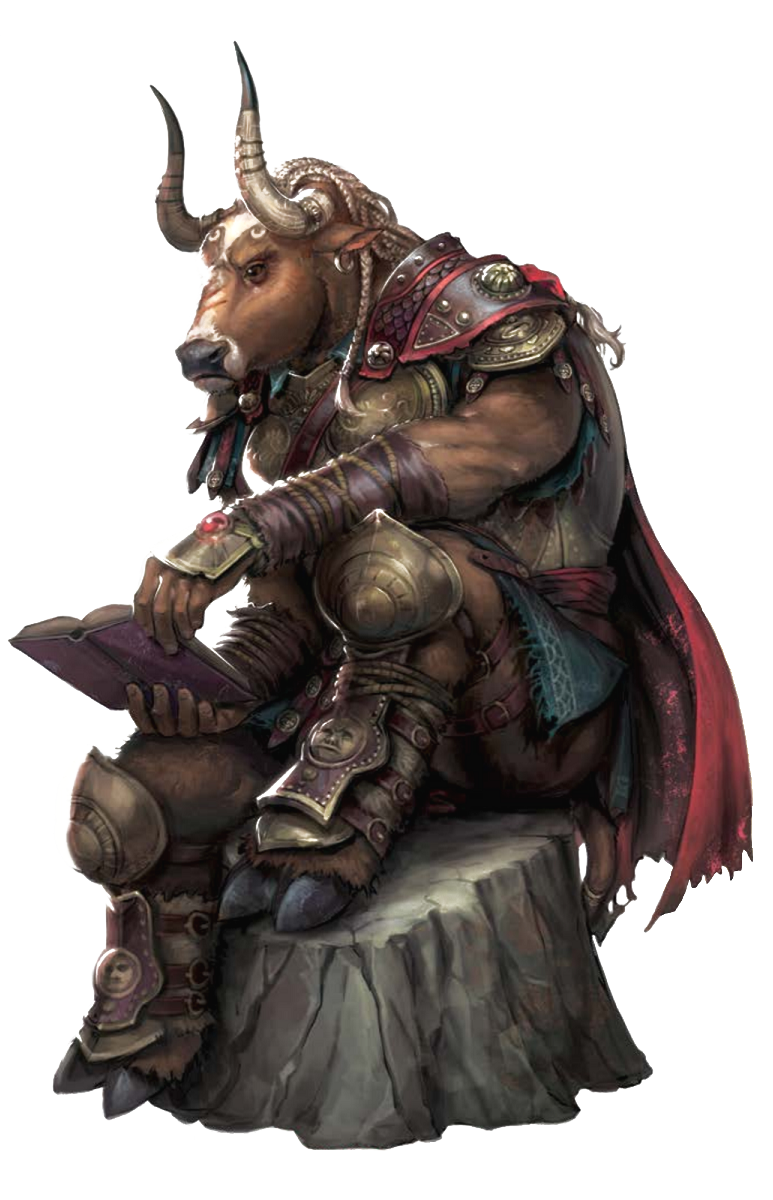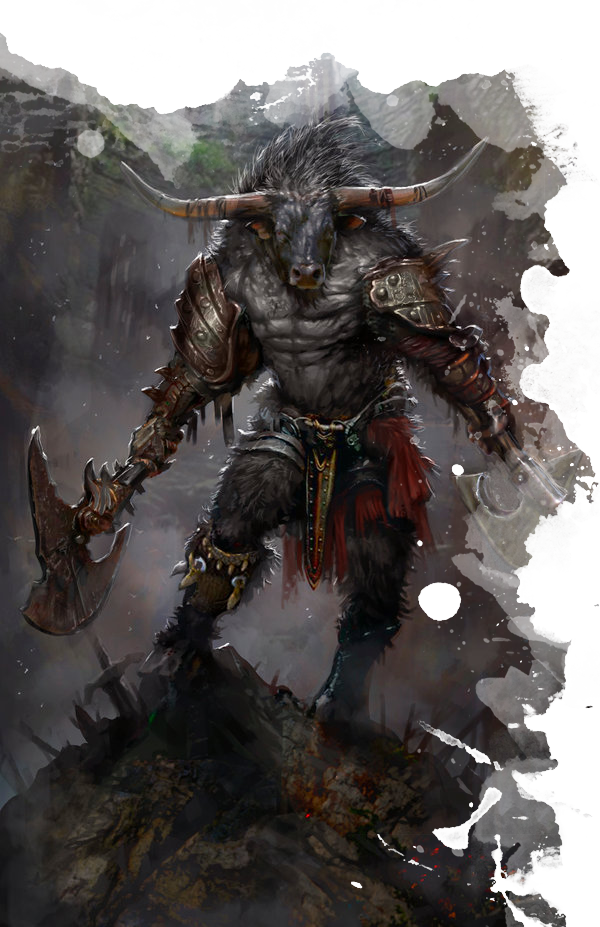Minotaur
SHARLAN, THE WHITE WITCH, WORKED HER WAY through the mountainous path. She came to a bend and upon coming around the turn she spied a hulking figure in the distance. Quickly she moved off the road and took shelter behind a large boulder to observe the newcomer. Soon she identified the newcomer as a minotaur, one which walked with purpose. She was suddenely startled by its Booming voice saying, "Come out milady, I can see you just fine, and mean you no harm!"
—Chronicles of the White Witch
A minotaur combines the features of a human and bull, with the build and musculature of a hulking humanoid, but with cloven hooves, a bovine tail, and, most distinctive of all, a bull's head. Fur covers a minotaur's upper body, coarse and thick on the head and neck, gradually thinning around the shoulders until it becomes humanlike hair over the arms and upper torso. The thick hair turns shaggy once more at the minotaur's waist and thickens around the loins and legs, with tufts at the end of the tail and around the powerful hooves.
Minotaurs take pride in their horns, the sharpness, size, and color of which are related to an individual's place in minotaur society. Fur and skin coloring runs from albino white to coal black, though most minotaurs have red or brown fur and hair.
Noble Competitors
Every day brings a new challenge to a minotaur. A single mistake can bring doom to an entire group or clan, while an individual’s heroic effort can ensure the entire group’s survival. Minotaurs thus place a premium on self-sufficiency and individual skill. They have a compulsion to keep
score, counting their deeds and tallying their accomplishments to compare to others.
Minotaurs love to win, but they see
defeat as a prod to improve their skills.
For Minotaurs competition exists only
when it is supported by a level playing field.
Competition measures talent, dedication, and effort.
Those factors determine survival in their home
territory, not reliance on magic items, money,
or other elements that can tip the balance one
way or the other. Minotaurs happily rely on such
benefits, but they are careful to remember that
such an advantage can always be lost. A minotaur
who relies too much on them can grow complacent,
a recipe for disaster.
Honor above All
Minotaurs are bound by a powerful sense of honor.
Each victory brings greater honor to both
individual minotaurs and their families.
Defeat invokes a stain that only death can
fully wash away.
Honor demands that minotaurs keep their word once it is offered, and each minotaur remains faithful to friends and clan above all else. Minotaurs typically strike up friendships with other creatures that display the minotaurs’ virtues and love of battle. To such friends, a minotaur becomes an ally whose support will never waver.
Symbol of the Labyrinth
Labyrinthine patterns are important to minotaurs, and these decorations appear on their clothing, armor, and weapons, and sometimes even on their hides. Each pattern is particular to a clan, and the pattern's size and complexity help minotaurs identify family allegiance and caste. The patterns evolve through the generations, growing more expansive based on clan members' deeds and a clan's history.

Minotaur Names
Minotaur clan names originate with a great hero whose descendants take on that name as their own, doing their best to live up to the ideals of their ancestor. On Krynn, clan names are always preceded by the prefix “es‐” for minotaurs from lands controlled by the island of Mithas, or “de‐” for minotaurs from areas under the sway of Kothas.
Male Names: Beliminorgath, Cinmac, Dastrun, Edder, Galdar, Ganthirogani, Hecariverani, Kyris, Tosher, Zurgas
Female Names: Ayasha, Calina, Fliara, Helati, Keeli, Kyri, Mogara, Sekra, Tariki, Telia
Clan Names: Athak, Bregan, Entragath, Kaziganthi, Lagrangli, Mascun, Orilg, Sumarr, Teskos, Zhakan
Minotaur Traits
Your minotaur character possesses a number of traits that reflect the power and superiority of your kind.
Ability Score Increase. Your Strength score increases by 2.
Age. Minotaurs enter adulthood at around the age of 25 and can live up to 150 years.
Alignment. Minotaurs believe in a strict code of honor, and thus tend toward law. They are loyal to the death and make implacable enemies.
Size. Minotaurs typically stand well over 6 feet tall and weigh an average of 300 pounds. Your size is Medium.
Speed. Your base walking speed is 30 feet.
Goring Rush. When you use the Dash action during your turn, you can make a melee attack with your horns as a bonus action.
Horns. You are never unarmed. You are proficient with your horns, which are a melee weapon that deals 1d6 piercing damage. Your horns grant you advantage on all checks made to shove a creature, but not to avoid being shoved yourself.
Labyrinthine Recall. You can perfectly recall any path you have traveled.
Languages. You can speak, read, and write Common and Undercommon.
Darkvision. accustomed to life underground, you have superior vision in dark and dim conditions. you can see in dim light within 60 feet of you as if it were bright light, and in darkness as if it were dim light. you can’t discern color in darkness, only shades of gray.
Subraces
The two kinds of minotaur, Shorthorns and Longhorns, are diferentiated by thier horn structure. Choose one of these Subraces.
Shorthorn
As a Shorthorn Minotaur you use strategy and cunning to overcome challenges. You like to keep the fight close when it is to your advantage, using your strength as an advantage one vs. one.
Ability Score Increase. Your wisdom score increases by 1.
Impaling Horns. On a successful use of your Goring Rush trait, in addition to dealing 1d6 peircing damage, you can choose to shove an opponent OR impale your opponent causing an additional 1d6 piercing damage.
Longhorn
As a Longhorn Minotuar you take pride in martial prowess. You prefer to trample your enemies before you.
Ability Score Increase. Your Constitution score increases by 1.
Hammering Horns. On a successful use of your Goring Rush trait, in addition to dealing 1d6 peircing damage, you can choose to shove an opponent OR knock a creature prone.

Credits
Art Page 1: random Pinterest tagged for PFRPG, D&D, etc
Art Page 2: Minotaur by PabloFernandezArtwrk on Deviantart